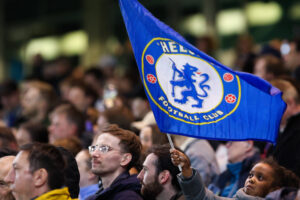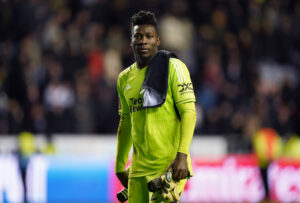On Saturday, in the eighth tier of English football (the Bostik League Division One North Division to be precise), Bowers & Pitsea were 1-0 down away to Maldon & Tiptree when Bowers’ midfielder Jamie Dicks appealed for a free-kick on the edge of the opposition penalty area. He was a few yards to the referee’s left and as the ball broke free to the official’s right, Dicks skipped across the back of him to retrieve the loose ball. They tangled legs in the process and the referee fell over. (You can see the incident here thanks to Back Of The Net Youtube channel).
After a bit of commotion, the official called over Dicks and showed him the red card for sending him to ground. Was this was just an accidental coming together or was the Bowers midfielder instantly aggrieved at the decision and saw an opportunity to take out his frustration on the official and possibly get away with it?
This particularly bizarre instance is a concentrated example of how inconsistent refereeing decisions at any level could affect not just a single game, but a whole season. Several incidents over last weekend’s Premier League fixtures highlighted just how inconsistent the so-called ‘elite’ referees in this country are and how their decisions can cost teams in the short and long term. Leicester’s Harry Maguire and Southampton’s Jack Stephens both raised their hands to opponents in retaliation to being fouled, but one was sent off and the other was just booked.
Inconsistent Premier League Red Cards
The Thin Red Line
One of the least talked about games of the Premier League weekend was Brighton & Hove Albion’s 1-1 draw with Huddersfield, which slipped under the radar amid Manchester and Merseyside derbies. The sides are seven and four points clear of the relegation zone respectively – neither in immediate danger, but both are still looking over their proverbial shoulders.
Brighton’s Dutch international midfielder Davy Propper had a troubled day. He missed an absolute sitter early on, curling wide of the right post when one-on-one, and was then given a straight red card by referee Anthony Taylor for a tackle on Jonathan Hogg. Both players were sliding into the challenge at pace and both players got a piece of the ball as they made contact with each other, but Propper’s tackling leg was slightly straightened as he connected with Hogg and after making contact with the ball, ploughed into his opponent’s shin.
Albion manager Chris Hughton said of the incident: “It is down to a referee on the day whether they want to send a player off for that challenge. You will see numerous challenges like that where there are two competitive players.”
Reckless
The above statement could never be more true when applied to Ashley Young’s abysmal attempt at a tackle on Sergio Aguero later on Saturday evening during the Manchester derby. As United fought to protect the 3-2 lead they somehow found themselves holding over the champions-elect, the Argentine was slid through on goal down the right side of the United penalty area. Young – who has become noticeably more aggressive in the past two seasons under Mourinho and in his new role at full back – recovered, leapt with both feet off the floor towards Aguero and as his body made contact with the ground, brushed his right foot over the top of the ball and into the striker’s knee.
In real-time, it didn’t look pretty, but Young came away with the ball. When viewed again, it could have been a career-ender. Referee Martin Atkinson – admittedly unsighted by at least four players in his eyeline – and his assistant, less than 20 yards away with an unobstructed view, chose no action. With a full complement of players, United held on to their single-goal lead and dampened City’s inevitable title celebrations.
How is one collision between two competitors deemed a sending off and one reckless, ugly lunge on an opponent in full flight not? The standards of officiating in the Premier League have been well documented this season and it’s by comparing incidents like these that you begin to understand why ‘the best league in the world’ is not going to be represented by a group of officials in Russia this summer.
Consistency
There is seemingly no consistency, no help of any great standard from assistants or fourth officials, and no recognised process to overturn injustices. The clunky introduction of VAR in some competitions this year has highlighted the lack of strategy and forethought in the decision-making process, as well as the dearth of confidence amongst the people trying to carry it all out.
Why is introducing a simple video check on key decisions so difficult? On average, there’s a break in play every 54 seconds in the Premier League (figures from 2016/17 season) and if the referee doesn’t deem there to be a reason to stop the game himself, it’s going to take less than a minute for a guy in the stands to whisper in his ear.
Fortunately for Brighton, the final 16 minutes they played with ten men on Saturday didn’t cost them any points in their fight against relegation, but it will likely have consequences. Although Propper has not set the league alight, he’s appeared in every Premier League game for the Seagulls this season alongside Mat Ryan, Pascal Groß and Lewis Dunk. He’s now going to miss three games: Crystal Palace (A), Spurs (H) and Burnley (A) – possibly the last three winnable games this season for the south-coasters, as both Manchester clubs and Liverpool follow after – and Hughton will have to draft in a replacement with nowhere near the same top level experience.
Consequences
It’s hypothetical, but what happens if Huddersfield capitalise on their man advantage? They could have gone on to score, win 2-1 and go level on points with Brighton. It wouldn’t be impossible for the Seagulls to lose their next six on the trot, meaning they would be relegated on goal difference if Southampton beat Bournemouth and Swansea in their remaining games. Inconsistent refereeing decisions that can’t be fixed in the moment can cost clubs points and managers their jobs.
The introduction of a clear, applicable set of guidelines for bad or dangerous tackling needs to be drafted and a player should only be sent off if several of the criteria are met – much like the LBW rule in cricket. We don’t need robots or computers to referee the beautiful game clinically and perfectly, but we do need consistency and the opportunity to be finally decisive over straight red cards that can affect a team for three games or more. It doesn’t take more than one extra viewing of each of the aforementioned incidents to see what is dangerous, what is competitive and what is downright ludicrous.
Going back to the ludicrous, ultimately only Jamie Dicks will ever really know what he was trying to do. But red cards change games of football, even more so than goals most of the time. Although Bowers & Pitsea’s ten men went on to recover admirably from 2-0 down to salvage a draw, the two dropped points leave them five adrift of second-placed Potters Bar Town. They’ll have to win both of their games in hand without Dicks to overhaul the Hertfordshire club and if they don’t manage to do so, a certain Scott Williams might be the biggest campaigner for VAR in non-league before he visits south Essex again.
Main Photo






